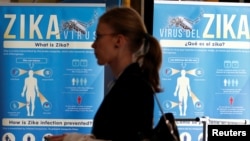Health officials in New Jersey said a baby girl born on Tuesday, to a mother who was infected with the Zika virus, has severe microcephaly.
A New Jersey doctor from the Hackensack University Medical Center said a 31-year-old woman visiting the U.S. from Honduras was infected with the virus after she was bitten by the Aedes mosquito early on in her pregnancy.
Microcephaly is the birth defect marked by small head size that can lead to developmental problems. Manny Alvarez, chief of obstetrics and gynecology at Hackensack, told NorthJersey.com that the premature newborn also suffers from intestinal and visual issues.
Factbox: Zika Virus
Zika Virus
- Mosquito-borne virus first identified in Uganda in 1947
- Known to circulate in Africa, the Americas and Asia
- About 20 percent of those infected become ill
- Symptoms similar to dengue and chikungunya, which are carried by same type of mosquito
- Most common effects are fever, rash, joint pain and red eyes; last 2-7 days
- Deaths are rare
- No vaccine or treatment available
- Best prevention is preventing mosquito bites
Source: WHO and U.S. CDC
Dr. Abdulla Al-Khan, the hospital’s director of maternal-fetal medicine and surgery, said the mother came to the United States for treatment after Zika symptoms were discovered.
The baby girl was delivered though a cesarean section, and Khan said is “completely Zika-affected,” but confirmation of the virus in the newborn is still pending tests.
The Zika virus is mainly transmitted via the Aedes mosquito. The connection between Zika and microcephaly was first discovered last year in Brazil, where more than 1,300 cases have been confirmed. All cases are considered related to Zika infections in the mothers.
The outbreak is affecting parts of Latin American and the Caribbean.
Some material for this report came from AP and Reuters.












